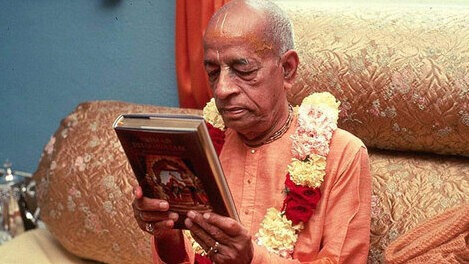Going to religious places, chanting of mantras, Deity worship, and wearing of religious clothing does not make one a pure devotee. It’s the consciousness of service to all attitude which truly counts.
Note: On this site, whenever ‘he’ or ‘himself’ is mentioned, this means males and females and not just males. For simplicity in writing, the ‘he’ or ‘himself’ is used.
A pure devotee lives for the benefit of others. He is always concerned for the well being of others. The below verses from the Shrimad-Bhagavatam gives one example of the consciousness of a pure devotee, the attitude and behavior of a pure devotee. Basically a pure devotees truly perceives the presence of God in every living being, and so he treats everyone as if they were God.
- He gives great respect to everyone
- He considers himself lower than everyone
- He considers himself insignificant and everyone else as significant
- He considers himself as the servant and everyone else as the master
- He will serve all others and will not expect any service in return
- He wants everyone delivered or saved, before himself
- He will live anywhere in the universe, as long as he can serve others
- He does not eat to live, he lives to feed others, etc..
Some examples of a pure devotee behavior: If a boat is sinking, a pure devotee will try to save everyone on the boat and he will save himself last. A pure devotee will not eat if there are others near him who are hungry, he will give it to them. A pure devotee will even take of his underpants to clothe others.
Please read carefully all the below verses which are from the Shrimad-Bhagavatam Canto 9, chapter 21. These fully support the above statements.
- Texts 3-5:
- Rantideva never endeavored to earn anything. He would enjoy whatever he got by the arrangement of providence, but when guests came he would give them everything. Thus he underwent considerable suffering, along with the members of his family. Indeed, he and his family members shivered for want of food and water, yet Rantideva always remained sober. Once, after fasting for forty-eight days, in the morning Rantideva received some water and some foodstuffs made with milk and ghee, but when he and his family were about to eat, a brāhmaṇa guest arrived.
- Text 6:
- Because Rantideva perceived the presence of the Supreme Godhead everywhere, and in every living entity, he received the guest with faith and respect and gave him a share of the food. The brāhmaṇa guest ate his share and then went away.
- Text 7:
- Thereafter, having divided the remaining food with his relatives, Rantideva was just about to eat his own share when a śūdra guest arrived. Seeing the śūdra in relationship with the Supreme Personality of Godhead, King Rantideva gave him also a share of the food.
- Text 8:
- When the śūdra went away, another guest arrived, surrounded by dogs, and said, “O King, I and my company of dogs are very hungry. Please give us something to eat.”
- Text 9:
- With great respect, King Rantideva offered the balance of the food to the dogs and the master of the dogs, who had come as guests. The King offered them all respects and obeisances.
- Text 10:
- Thereafter, only the drinking water remained, and there was only enough to satisfy one person, but when the King was just about to drink it, a caṇḍāla appeared and said, “O King, although I am lowborn, kindly give me some drinking water.”
- Text 11:
- Aggrieved at hearing the pitiable words of the poor fatigued caṇḍāla, Mahārāja Rantideva spoke the following nectarean words.
- Text 12:
- I do not pray to the Supreme Personality of Godhead for the eight perfections of mystic yoga, nor for salvation from repeated birth and death. I want only to stay among all the living entities and suffer all distresses on their behalf, so that they may be freed from suffering.
- Text 13:
- By offering my water to maintain the life of this poor caṇḍāla, who is struggling to live, I have been freed from all hunger, thirst, fatigue, trembling of the body, moroseness, distress, lamentation and illusion.
- Text 14:
- Having spoken thus, King Rantideva, although on the verge of death because of thirst, gave his own portion of water to the caṇḍāla without hesitation, for the King was naturally very kind and sober.
- Text 15:
- Demigods like Lord Brahmā and Lord Śiva, who can satisfy all materially ambitious men by giving them the rewards they desire, then manifested their own identities before King Rantideva, for it was they who had presented themselves as the brāhmaṇa, śūdra, caṇḍāla and so on.

